| A | B |
|---|
| A type of grouping that excludes some members that share a common ancestor with members that are included in the taxon. | Paraphyletic, 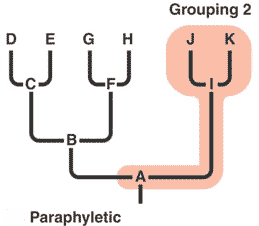 |
| A species or group of species that is closely related to the group of species being studied, but clearly not as closely related as any of the study-group members are to each other. | Out-group |
| A diagram depicting patterns for shared characteristics among taxa is called a(n) ______. | cladogram,  |
| In classification, the taxonomy category above class is called ______. | phylum |
| The _____ is the chronicle of evolution over millions of years of geological time engraved in the order in which fossils appear in rock strata. | fossil record |
| The analysis of the resemblances is called _____. | cladistics |
| The analytical study of the diversity and relationships of organisms, both present-day and extinct, is called _____. | systematics |
| In classification, the taxonomic category above genus is called _____. | family |
| A phylogenetic tree in which the lengths of the branches reflect the number of genetic changes that have taken place in a particular DNA or RNA sequences in the various lineages is called a(n) _____. | phylogram, 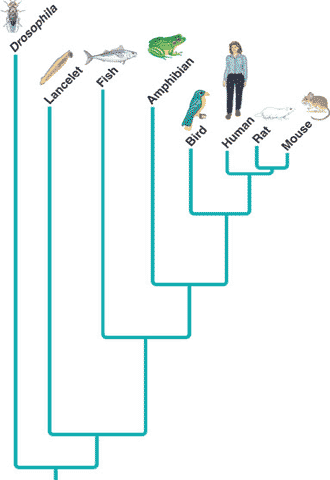 |
| A character that is shared by species outside of a particular taxon is called a(n) _____. | shared primitive character |
| An evolutionary timing method based on the observation that at least some regions of the genome evolve at constant rates. | Molecular clock |
| Homologous genes that are found in the same genome due to gene duplication are called _____. | paralogous genes,  |
| In classification, the taxonomic category above family is called _____. | order |
| A type of grouping in which taxa are grouped together without linking them to an ancestral form. | polyphyletic, 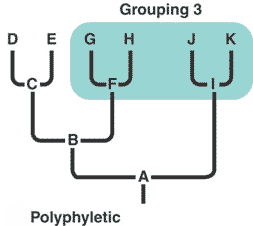 |
| A taxonomic category above the species level, designated by the first word of a species' binomial scientific Latin name. | genus |
| The hypothesis that much of evolutionary change in genes and proteins has no effect on fitness and therefore is not influenced by Darwinian natural selection. | Neutral theory |
| In classification, the taxonomic category above order is called _____. | class |
| A branching diagram that represents a hypothesis about evolutionary relationships is called a(n) _____. | phylogenetic tree |
| An evolutionary novelty unique to a particular clade is called a(n) _____. | shared derived character |
| The taxonomic category above the kingdom level is called _____. | domain |
| When writing a scientific name, what is capitalized and what font style is used? | Only the first letter of the genus name is capitalized. Italics are used for all letters. |
| The scientific name is composed of the organisms ______ name and _____ name. | genus and species name |
| Felis catus and Felis concolour belong to the same ____. | They belong to the same genus, but not species. Since they belong to the same genus, they automatically belong to the same family, order, class, phylum, kingdom and domain also. |
| Put the following terms in order from largest group to smallest as far as the number of species that belong to each: Class, Domain, Family, Genus, Kingdom, Order, Phylum, Species, | Domain, Kingdom, Phylum, Class, Order, Family, Genus, Species (Remember the phrase, "Did King Phillips court order fresh grilled salmon?" |
| A genus is composed of a number of related ____. | species |
| Cat is a _______ name that is different from country to country or language to language but Felis catus is a _______ name that is used by all scientists throughout the world. | common, scientific |
| What genus does Ursus maritimus belong in? | Ursus (the first part of a scientific name is always the name of the genus to which the organism belongs) |
| Homo sapien belongs to which species? | sapien (the second name of the scientific name is always the species name to which the organism belongs) |
| The animals Panthera leo (lion) and _____ tigris (tiger) belong to the same genus. | Panthera |
| What kind of analysis focuses on the order in which derived characters appeared in organisms? | cladistic analysis |
| In biology, an evolutionary innovation is also referred to as a(n) ____. | derived characteristic (for example, feathers were an evolutionary innovation that set feathered dinosaurs, and later, birds, apart from all other reptiles. Therefore feathers are a type of derived characteristic that today would only be seen in birds and not other animals) |
| What do scientists consider when they perform a cladistic analysis? | derived characteristics |
| A ____ is a diagram that shows evolutionary relationships based on derived characteristics. | cladogram,  |
The diagram pictured below is an example of a ___.,  | cladogram,  |
| ______ is the evolutionary history of a species or group of related species. | Phylogeny |
| Similarity between two species that is due to convergent evolution rather than to descent from a common ancestor with the same trait is called _____. | analogy |
| A principle of _____ states that when considering multiple explanations for an observation, one should first investigate the simplest explanation that is consistent with the facts. | maximum parsimony |
| A phylogenetic tree in which the lengths of the branches reflect measurements of geologic time. | ultrametric tree, 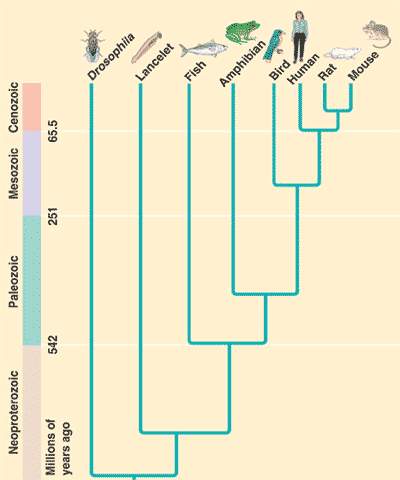 |
| A type of grouping in which the taxon includes all species derived from a single ancestral species. | Monophyletic, 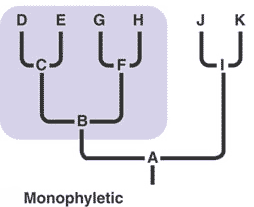 |
| Another word for an analogous structure is a(n) _______. | homoplasy |
| Another word for a homoplasy is a(n) ______. | analogous structure |
| A group of species that includes an ancestral species and all its descendants is called a(n) _____. | clade |
| Similarity in characteristics resulting from a shared ancestry is called ____. | homology |
| Homologous genes that are passed in a straight line from one generation to the next, but have ended up in different gene pools because of speciation are called ______. | orthologous genes,  |
| The comparison of nucleic acids or other molecules in different species to infer relatedness. | molecular systematics |
| The branch of biology concerned with naming and classifying the diverse forms of life is called _____. | taxonomy |
| The second broadest taxonomic category after domain is called _____. | kingdom |
| In a cladistic study of evolutionary relationships among taxa of organisms, the group of taxa that is actually being studied is called the _____. | in-group |
| The principle of _______ states that when considering multiple phylogenetic hypotheses, one should take into account the one that reflects the most likely sequence of evolutionary events, given certain rules about how DNA changes over time. | maximum likelihood |